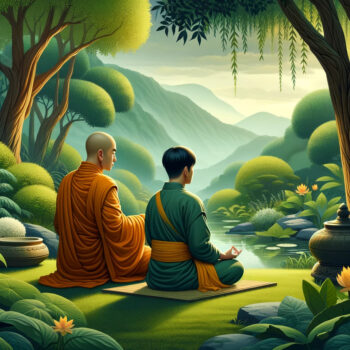 By Robert Piper
By Robert Piper
When I was 18 years old, I suffered from anxiety and chronic stomach problems. A compassionate physician and practicing Buddhist referred me to a Taoist monk who specialized in meditation and martial arts. I ended up healing myself of disease by doing meditation, and went on a great journey of self-discovery.
Here are 9 lessons I learned while studying with a Buddhist monk.
1. Keep trying until you get it right.
The most important life lesson I learned was to try something three times (maybe even four times) before you stop trying and move on. This monk also taught me that, even after multiple tries, you should work on different angles to approach difficult things.
If you keep trying, you’ll eventually get where you’re going.
[pro_ad_display_adzone id=”110028″]
2. The answer to your question is inside of you.
As part of the original monastery training, a monk didn’t answer direct questions from a student unless they were well thought-out questions. A Chinese proverb says, “Teachers open the door, but you must enter by yourself.”
Some forms of Zen Buddhism use a very similar training style. An old saying (by Taoist monks) goes like this: “In making a four-corner table, the teacher shows the student how to make one corner. It’s the student’s job to figure out how to make the other three.”
They did this because they were preparing a student to deal effectively with problems in the real world.
I traveled to South Korea once, and I found it fascinating how much you have to rely on your intuition when you don’t speak the native language of a country. I remember one instance when I had trouble explaining to the cab driver where my hotel was, and he didn’t speak English. So I had to get out of the cab and ask several people until I could find someone to tell the cab driver in Korean how to get to my hotel.
In life, whenever we try new things, we have to go into new places with only a small amount of information. The real world doesn’t give us all the answers. The greatest teacher is inside of us.
3. Real wisdom in life comes from doing something and failing.
Prior to starting meditation, I used to get upset when I’d try something and fail.
I’ve been in sales since I was sixteen. I remember going to work and getting so angry with myself because I didn’t make a sale. If I ever got rejected, I’d get upset with myself and want to quit my job. But I just kept failing over and over until I became good at it.
I remember, when I first started doing meditation, I ran into several problems. For example, at first it was difficult to calm down; but if you stick with it, its gets easier and easier. I tried for only a few minutes, and then every day, I added more time onto my meditation.
When we struggle, we learn about ourselves and what we need to do to become stronger.
4. When you start to do meditation you recognize the egotistical mind.
Everything in the ego’s world is the result of comparing. I compared myself to other salesmen and would blame myself because I wasn’t making as much money as them.
When I started meditation, I began to build separation from this egoistical mind, which consistently makes these comparisons. Many of us try something and get rejected, so we give up. Even worse, we blame ourselves for a long time and get depressed. When I started meditation, I began to identify my ego and was able to build separation from it.
That’s what happens when we meditate: We separate from the part of ourselves that dwells on comparisons, and start learning to live a life that isn’t driven by our egos.
5. We must be both compassionate and resilient.
The monk wouldn’t meet with me to train unless I called him a minimum of three times. I hated this part. I used to call and call and he would never answer. But this is how life is. How many times do you have to call or email someone to get something done in the real world? It’s usually several times.
Most of us blame ourselves when we try once to do something and fail. At the time, I hated this part of the training, but now I think it was the most important life lesson.
There’s a Taoist proverb that says, “Cotton on the outside, steel on the inside.”
It reminds us to be compassionate, but not weak.
[pro_ad_display_adzone id=”110030″]
6. Patience is a virtue.
The monk always made me wait — and I dreaded this.
For example, when I got to his house to train, he’d make me wait for a minimum of a half-hour, sometimes longer. We’d go out to dinner on Friday nights and he’d show up at the restaurant an hour late.
He’d tell me to meet him at a particular restaurant at 7:00. I’d get there and find out that he wasn’t there. So I’d usually be sitting in the restaurant by myself fumbling with my phone, acting like I was texting someone, while worrying about what everyone at the restaurant was thinking about me.
Keep in mind, it’s not like I could call him; I don’t think the guy ever turned his cell phone on. Then he’d show up at about 8:15 and act like nothing happened.
His first question was always, “How’s your mother and father?” (Of course in my head I’m thinking, “What do you mean, ‘How’s my mother and father?’ I just waited here for an hour and fifteen minutes.”)
But after a few years of this, it never bothered me; and not only that, it spread to every area of my life. Because of this training, I can honestly say that I very rarely get upset about anything. I never get agitated anymore when I have to wait in a long line or when someone cuts me off on the highway.
Patience is the gift of inner calm.
7. Detach from your ego.
At first, it’s hard to sit at a restaurant by yourself. You’re constantly worrying, thinking that people probably think you’re a loser because you’re sitting by yourself. But the reality is, you will never be happy if you care about what people think you!
Prior to starting meditation, I’d get upset over just about anything. Now, nothing really bothers me. Recently, I was in the airport and there was a several hour delay on my flight. I just used that time to do meditation. Ten years ago, I would have become extremely upset. An airplane delay would have ruined my day.
When you let go of your ego needs, you can more easily accept and benefit from whatever comes your way.
8. In Taoism, they say, “No self, No enemy.”
It’s the enemy within that causes all of our fears, worries, and insecurities. If you come to terms with this enemy within, it will impact every area of your life. It’s the identification with the “self/ego” that causes all of life’s problems.
How many times do we not go for something because of fear? Think about all the fears we have conjured up that stop us from being truly happy. If you can conquer the enemy within yourself, you won’t have an enemy outside yourself.
9. Happiness come from within, and also comes from outside.
I learned this from observing the Buddhist Physician I met. He used to do meditation in his office before he would interact with his patients. He was among the happiest and most compassionate people I’ve ever met.
By creating happiness inside, he was able to increase that emotional state by spreading it to others.
We must cultivate happiness from within and work to spread it to everyone we interact with. As the monk used to say, “Everyone has a purpose or a mission in life.”
We have to find happiness within and find our purpose on the outside.
About the author:
Robert Piper is a meditation instructor & the creator of monkinthecity.com. He studied with a Taoist monk for 9 ½ years & traveled to Asia and Australia in search of other meditation teachers. Robert is currently writing a book on meditation to make it more accessible for stress relief, health and happiness.
[pro_ad_display_adzone id=”110027″]






